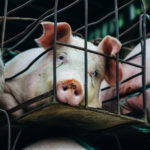Good People Break Bad Laws: Animal Rights Activists

Activists around the globe promote 2018’s Dominion as the quintessential animal rights documentary that exposes the cruelty underlying the modern animal agriculture industry. But, it was 2014’s Lucent that landed director Chris Delforce in hot water.
For revealing the rampant abuse in Australian piggeries, Delforce faced years in prison after multiple charges were laid against him, under the Surveillance Devices Act 2007 (NSW). However, lucky for him, the charges didn’t stick.
Since that failed attempt at silencing revelations around the brutality perpetrated upon animals, the NSW Liberal Nationals government has drafted a series of bills designed to gag those trying to make the public aware of what actually goes on behind the gates at factory farms and slaughterhouses.
There’s the Biosecurity Act 2015 (NSW), which provides draconian punishments for collecting such footage and it allows law enforcement to potentially seize these images if held by media outlets. While last year’s Right to Farm Bill 2019 (NSW) altered the scope and the penalties for trespassing.
Although this push to enact ag-gag laws – which is mirrored countrywide, including at the federal level – is seen by many animal welfare activists as a sign that the breaking of laws in order to reveal agricultural practices that should be outlawed is not only justified, but it’s having the desired effect.
Dissent grows louder
“These laws are yet another superficial attempt to appease lobbyists from the powerful animal agribusiness industry and frighten whistleblowers into silence,” said NSW Animal Justice Party MLC Emma Hurst.
“It suggests to me that the agribusiness industry is nervous about transparency and wants to ensure consumers remain unaware of the horrific – yet legal – treatment of animals in the industry,” she told Sydney Criminal Lawyers.
The Morrison government last year called on the states to pass further ag-gag laws in line with it. And the Berejiklian government was so keen to follow suit that it amended biosecurity regulations to provide for on-the-spot fines for farm trespassers, prior to passing the Right to Farm laws.
Hurst explains that the community won’t be silenced. She advises that “concerned citizens” are gathering further evidence of cruelty right now, as the “primary enforcement agency” – the RSPCA NSW – doesn’t have enough funds to prosecute most animal cruelty cases, as it’s a private charity.
“If we continue to fail to protect the most vulnerable members of society, and introduce legislation that entrenches their suffering, our community will not stand for it,” the animal welfare advocate warned.
Justified civil disobedience
“The Animal Defenders Office’s (ADO) motto is ‘using the law to protect animals’,” said ADO executive director Tara Ward. “The problem is, however, that the law is just not very good at protecting animals. It’s structurally designed not to protect them.”
“For some members of the public, the only way to use the law to protect animals is to break it,” the senior solicitor continued. “Civil disobedience can draw attention to the fundamentally unjust nature of our laws when it comes to animals.”
Founded in 2014, the Animal Defenders Office is a national community legal centre that specialises in protecting animal welfare and upholding their rights, as well as defending animal activists, who fall short of the law due to their direct actions.
“History is full of nonviolent protest and social justice activism that was considered illegal at the time,” Ward explained. And she listed the Suffragettes, the African American civil rights movement, the Anti-Apartheid Movement and Gandhi’s satyagraha actions in opposition to British colonialism.
“History has determined the justness of all these causes,” Ward underscored.
Stark protections
According to the lawyer, when the ADO opened its doors, those working there were under the impression the centre would be “using the law to protect animals”, however they weren’t aware of just how inadequate Australian laws are when it comes to protecting them.
“The law is well and truly stacked against the interests of animals and increasingly, against those who want to protect them,” she explained. “So, it’s not really a surprise that our fastest growing caseload is representing people who take direct action for animals.”
Ms Ward explained that activists have been arrested for public nuisance for showing slaughterhouse images on the street. There’s been arrests over stealing for rescuing starving animals, while aggravated trespass laws have claimed those chaining themselves to equipment in abattoirs.
“When these people come before the courts, magistrates tend to frown and talk of vigilantism and deliver harsh sentences,” the lawyer explained. However, on appeal, she said judges tend to be more sympathetic, understanding that they’re “passionate”, and lighter sentences are applied.
And Ward added that while the ag-gag laws “may stop a few activists getting in, they will not stop the truth getting out”.
The people denied
Ms Hurst too points to the inadequacy of the local laws to protect animals. And when she’s moved to get them changed the attempts have been resisted. She recently chaired an inquiry into the use of battery cages on hens, which received thousands of submissions, and was backed by veterinary scientists.
“Yet the government supported the continued use of cages. They won’t legislate to protect hens,” she said. “They won’t listen to the 14,000 submissions.” Indeed, a recent report by the Federal Department of Agriculture found that 91 percent of Australians want this practice stopped.
Other priorities on the animal rights activists’ agenda are stoppling live exports, Ms Ward noted, along with ending the practices of confining pigs in metal crates, gunning down native ducks for sport, and confining circus lions to tiny cages.
But, as Hurst outlines rather than taking action in response to the concerns that are mounting in the community over these practices, the NSW government is passing more laws to protect the perpetrators.
“The only good news is that laws to avoid public scrutiny are probably too late,” Ms Hurst concluded on a positive note. “Australians love animals and I’m confident they will never accept these continued abuses on them.”







